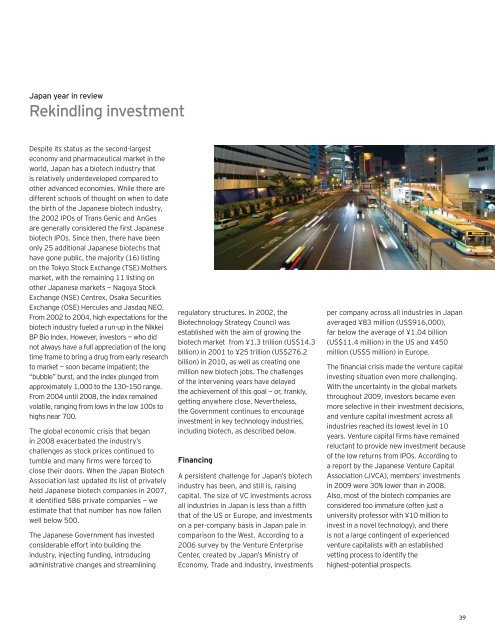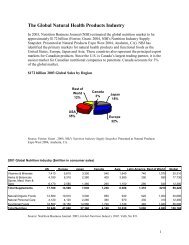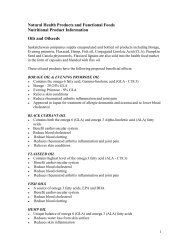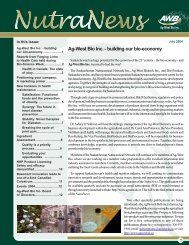Beyond Borders: Global biotechnology report 2010
Beyond Borders: Global biotechnology report 2010
Beyond Borders: Global biotechnology report 2010
You also want an ePaper? Increase the reach of your titles
YUMPU automatically turns print PDFs into web optimized ePapers that Google loves.
Japan year in review<br />
Rekindling investment<br />
Despite its status as the second-largest<br />
economy and pharmaceutical market in the<br />
world, Japan has a biotech industry that<br />
is relatively underdeveloped compared to<br />
other advanced economies. While there are<br />
different schools of thought on when to date<br />
the birth of the Japanese biotech industry,<br />
the 2002 IPOs of Trans Genic and AnGes<br />
are generally considered the first Japanese<br />
biotech IPOs. Since then, there have been<br />
only 25 additional Japanese biotechs that<br />
have gone public, the majority (16) listing<br />
on the Tokyo Stock Exchange (TSE) Mothers<br />
market, with the remaining 11 listing on<br />
other Japanese markets — Nagoya Stock<br />
Exchange (NSE) Centrex, Osaka Securities<br />
Exchange (OSE) Hercules and Jasdaq NEO.<br />
From 2002 to 2004, high expectations for the<br />
biotech industry fueled a run-up in the Nikkei<br />
BP Bio Index. However, investors — who did<br />
not always have a full appreciation of the long<br />
time frame to bring a drug from early research<br />
to market — soon became impatient; the<br />
“bubble” burst, and the index plunged from<br />
approximately 1,000 to the 130–150 range.<br />
From 2004 until 2008, the index remained<br />
volatile, ranging from lows in the low 100s to<br />
highs near 700.<br />
The global economic crisis that began<br />
in 2008 exacerbated the industry’s<br />
challenges as stock prices continued to<br />
tumble and many firms were forced to<br />
close their doors. When the Japan Biotech<br />
Association last updated its list of privately<br />
held Japanese biotech companies in 2007,<br />
it identified 586 private companies — we<br />
estimate that that number has now fallen<br />
well below 500.<br />
The Japanese Government has invested<br />
considerable effort into building the<br />
industry, injecting funding, introducing<br />
administrative changes and streamlining<br />
regulatory structures. In 2002, the<br />
Biotechnology Strategy Council was<br />
established with the aim of growing the<br />
biotech market from ¥1.3 trillion (US$14.3<br />
billion) in 2001 to ¥25 trillion (US$276.2<br />
billion) in <strong>2010</strong>, as well as creating one<br />
million new biotech jobs. The challenges<br />
of the intervening years have delayed<br />
the achievement of this goal — or, frankly,<br />
getting anywhere close. Nevertheless,<br />
the Government continues to encourage<br />
investment in key technology industries,<br />
including biotech, as described below.<br />
Financing<br />
A persistent challenge for Japan’s biotech<br />
industry has been, and still is, raising<br />
capital. The size of VC investments across<br />
all industries in Japan is less than a fifth<br />
that of the US or Europe, and investments<br />
on a per-company basis in Japan pale in<br />
comparison to the West. According to a<br />
2006 survey by the Venture Enterprise<br />
Center, created by Japan’s Ministry of<br />
Economy, Trade and Industry, investments<br />
per company across all industries in Japan<br />
averaged ¥83 million (US$916,000),<br />
far below the average of ¥1.04 billion<br />
(US$11.4 million) in the US and ¥450<br />
million (US$5 million) in Europe.<br />
The financial crisis made the venture capital<br />
investing situation even more challenging.<br />
With the uncertainty in the global markets<br />
throughout 2009, investors became even<br />
more selective in their investment decisions,<br />
and venture capital investment across all<br />
industries reached its lowest level in 10<br />
years. Venture capital firms have remained<br />
reluctant to provide new investment because<br />
of the low returns from IPOs. According to<br />
a <strong>report</strong> by the Japanese Venture Capital<br />
Association (JVCA), members’ investments<br />
in 2009 were 30% lower than in 2008.<br />
Also, most of the biotech companies are<br />
considered too immature (often just a<br />
university professor with ¥10 million to<br />
invest in a novel technology), and there<br />
is not a large contingent of experienced<br />
venture capitalists with an established<br />
vetting process to identify the<br />
highest-potential prospects.<br />
39








